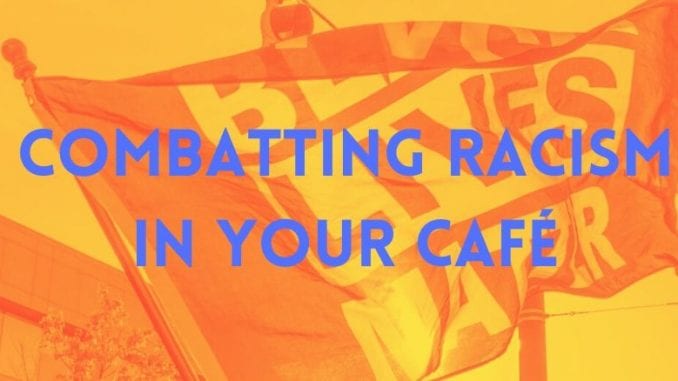
You want to be actively anti-racist, but maybe you don’t know where to start? Here are some suggestions.
BY MARK VAN STREEFKERK
BARISTA MAGAZINE ONLINE
Over the past two weeks, protests have erupted across the United States demanding justice for George Floyd and other Black people killed by police, along with calls to reallocate police funds and establish racial equity. America has reached, and surpassed, a tipping point around systemic racism that is long overdue. As we watch protesters take to the streets night after night from our TV sets, laptops, phone screens—and even from the streets ourselves—we’re witnessing a revolution. If you’re not Black, and haven’t been involved in anti-racism work, this is your sign to jump in and start.
What does race have to do with coffee though? A whole lot. For starters, coffee is a product of colonialism, ongoing and mostly unchecked. As part of the coffee community, we have to recognize the many ways this industry has failed Black people. If you work at or own a café, this is the time to set up anti-racist training, or renew your commitment to anti-racism. Below are five actions you can take at your café. For independent and mom-and-pop cafés, where profit margins are thin and there are scant resources for anything above basic functions, this guide is especially for you! Keep in mind, this is by no means a conclusive list. There are many voices more qualified than us, and we here at Barista Magazine are learning and growing right there with you.
1. If you can’t afford anti-racist training or consulting, ask for help.
Getting an independent consultant, or company, to help facilitate an anti-racist training or workshop for your team is a great way to start. But what if you simply can’t afford it? Molly Flynn, founder of the #coffeetoo initiative, and project coordinator/service repair tech at Broadcast Coffee, has some excellent suggestions: “For companies that can’t afford anti-racism training by themselves, I wonder if they could either: Go in on it with other coffee shops or with their vendor partners to split the costs, or host a throwdown + training or something, and obtain sponsorship from someone like Pacific to cover the costs,” she says.
Alea Shurmantine, Oatly’s market development manager for the Pacific Northwest and Western Canada, said Oatly’s national market development team—which is generally tasked with community engagement in the coffee world—is offering to help cafés and businesses raise funds or contribute toward trainings. “It’s our job to ask what the coffee community—and service industry as a whole—wants and needs, and to find ways to deliver on what we hear. Right now, we want to support shops and groups who are doing the work,” she says. “There are a lot of ways that we can look: donation-matching for folks who are fundraising, donating product wherever it might be needed, financial support for shops looking to create structural change, etc. So helping out with the cost of anti-racism training is one tangible thing we can do! We want to support our community partners who are actively working to be better, and we understand that some shops genuinely aren’t able to afford something like professional anti-bias training, so we want to help lower that barrier for them.”
Interested cafés are encouraged to reach out at HeyBaristaUS@oatly.com.
2. Educate.
As ubiquitous as it is, don’t only take your cues about racial justice from social media. There are so many incredible books to read about anti-racism, African American history, and Black liberation movements that offer a greater perspective and cover far more ground. For starters, we recommend So You Want To Talk About Race by Ijeoma Oluo, or How To Be an Antiracist by Ibram X. Kendi. Choose a monthly book to read and offer to offset the cost for your team. Instead of Amazon, order books through these Black-owned bookstores.
In addition to books, consider these TED Talks, podcasts, and movies and TV shows you can stream right now. You can also invite your community to join in via a monthly book or movie club.
3. Raise money and set up ongoing donations.
If there’s one thing a café can do well, it’s host a fundraiser. This can be anything from a throwdown, a raffle, or donating the sales from a certain item to a particular organization, bail fund, or nonprofit. Molly also suggests asking customers if they’d like to “round up” to donate to a particular fund. Ask other businesses in your neighborhood to match your contributions. Here’s a super list of places to donate. Make sure to check out the local groups doing racial justice work in your community, and see if you can set up an ongoing donation.
4. Use anti-biased application screenings.
Anti-biased software like Blendoor helps eliminate unconscious bias in the resume-screening process. Make sure you post job openings at local community centers and schools, and not just on a barista Facebook group. Check out this article for other ways to make hiring more equitable.
5. It’s OK to get called out. Keep going.
What happens if you or someone on your team get called out for saying or doing something racist? We guarantee you’re not the first. We are imperfect humans doing what we can, and this is a lifelong journey. Get used to discomfort, and get used to changing your mind. Getting called out is an opportunity to listen, reflect, take responsibility for your intent and impact, make it right, and change future behavior. Take a deep breath, give yourself time to regulate your feelings, and really listen to why you’re being called out. Really try to see it from the other person’s side. If you need to vent or process your feelings, do so with a friend or therapist, not the person who feels harmed. Apologize, and do better. Reach out for help if you need it. In some cases, a larger process of accountability might be necessary. If you’re honest and transparent about taking responsibility for your intent and impact, and actively change, you are modeling to your community and team that it’s OK to mess up, as long as you keep going and try to do better.
Many thanks to Molly Flynn for her help with this article.

ABOUT THE AUTHOR
Mark Van Streefkerk is Barista Magazine’s social media content developer and a frequent contributor. He is also a freelance writer, social media manager, and novelist based out of Seattle. If Mark isn’t writing, he’s probably biking to his favorite vegan restaurant. Find out more on his website.
